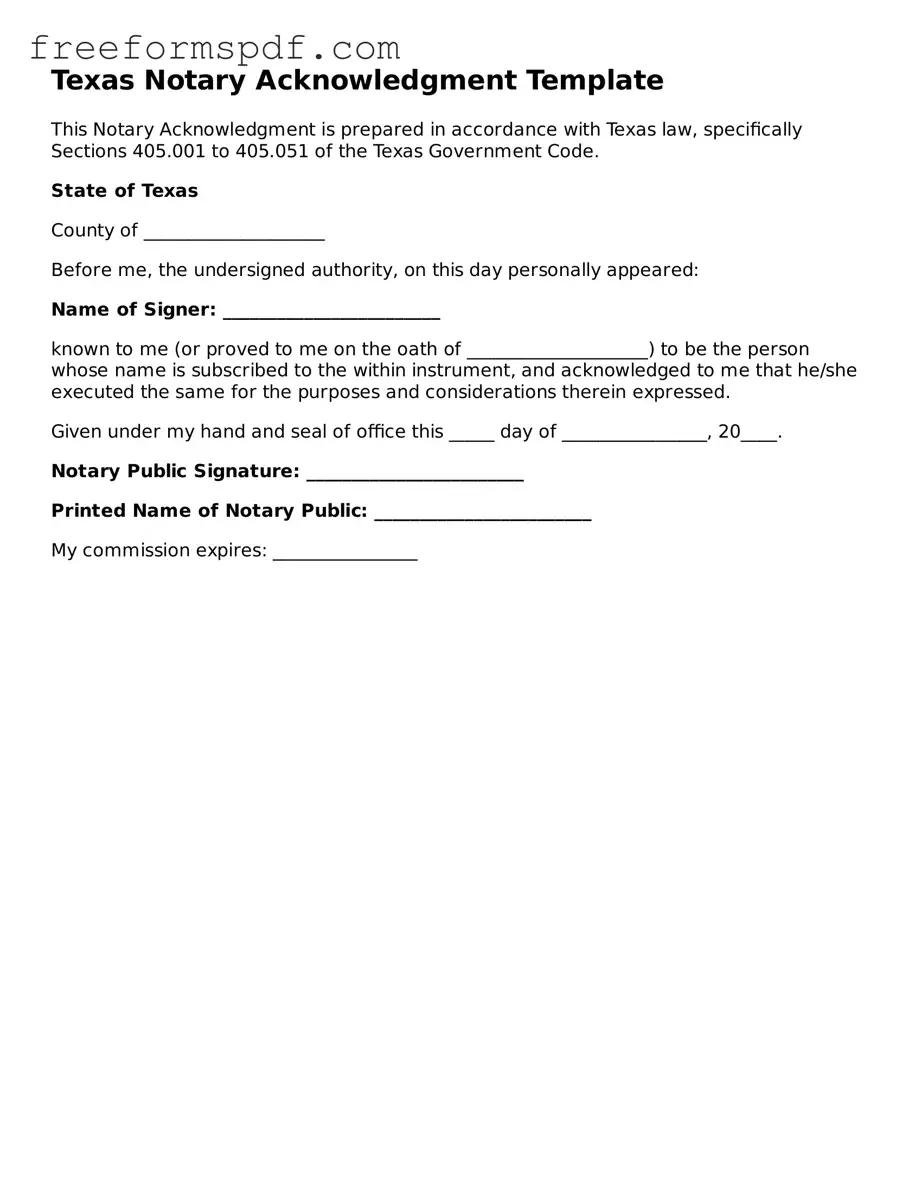Attorney-Verified Notary Acknowledgement Document for Texas State
Common mistakes
-
Incorrect Signer Information: One common mistake is providing inaccurate names or details of the person signing the document. Ensure that the name matches the identification exactly.
-
Missing Date: Forgetting to include the date of the acknowledgment can render the form incomplete. Always double-check that the date is filled in correctly.
-
Improper Notary Signature: The notary must sign the form as it appears on their notary commission. Any deviation can lead to complications.
-
Failure to Include Notary Seal: A notary seal is essential for the acknowledgment to be valid. Leaving it out can invalidate the document.
-
Using an Expired Notary Commission: Notaries must ensure their commission is current. An expired commission can lead to legal issues.
-
Not Verifying Identification: Notaries should always verify the signer’s identification. Skipping this step can lead to questions about the document's authenticity.
-
Ignoring State-Specific Requirements: Each state may have unique requirements for notary acknowledgments. Familiarize yourself with Texas laws to avoid pitfalls.
-
Incomplete Address Information: The acknowledgment should include the address of the signer. Omitting this detail can create confusion later.
-
Not Keeping Records: Notaries are required to maintain a record of their acknowledgments. Failing to do so can lead to accountability issues.
-
Rushing the Process: Take your time when filling out the acknowledgment form. Hasty mistakes are often the most costly.
Learn More on This Form
-
What is a Texas Notary Acknowledgement form?
The Texas Notary Acknowledgement form is a legal document used to verify the identity of a person signing a document. It confirms that the signer appeared before a notary public and acknowledged that they signed the document voluntarily.
-
Why is a Notary Acknowledgement necessary?
A Notary Acknowledgement is important because it helps prevent fraud. It ensures that the person signing the document is who they claim to be and that they understand the contents of the document. Many legal documents require notarization to be considered valid.
-
Who can act as a notary in Texas?
In Texas, a notary public must be at least 18 years old, a resident of Texas, and have no felony convictions. They must also complete the necessary training and obtain a notary commission from the state.
-
How do I complete a Notary Acknowledgement form?
To complete a Notary Acknowledgement form, the signer must appear before the notary. The notary will verify the signer's identity, witness the signing of the document, and then fill out the acknowledgment section of the form. This includes the date, the notary's signature, and their official seal.
-
Can I use a Texas Notary Acknowledgement form for any document?
Yes, a Texas Notary Acknowledgement form can be used for various types of documents, including contracts, deeds, and affidavits. However, some documents may have specific requirements, so it is advisable to check if a particular form is needed.
-
Is there a fee for notarization in Texas?
Yes, notaries in Texas can charge a fee for their services. The maximum fee for a standard acknowledgment is set by state law. It's important to confirm the fee with the notary before the service is performed.
-
How long is a Notary Acknowledgement valid?
A Notary Acknowledgement does not expire. However, the underlying document's validity may depend on other factors, such as the nature of the agreement or any applicable laws.
-
What should I do if I suspect fraud in a notarized document?
If you suspect fraud, you should gather any evidence you have and contact law enforcement. You may also want to consult with a legal professional to explore your options for addressing the situation.
Misconceptions
When it comes to the Texas Notary Acknowledgement form, there are several common misconceptions that can lead to confusion. Understanding these misconceptions can help ensure that individuals use the form correctly and avoid potential issues. Here’s a closer look at four prevalent misunderstandings:
- Misconception 1: A notary can notarize any document.
- Misconception 2: The notary must know the signer personally.
- Misconception 3: The notary is responsible for the content of the document.
- Misconception 4: A notarized document is automatically valid in all states.
This is not entirely true. While notaries can notarize many types of documents, there are specific limitations. Certain documents may require additional qualifications or may not be permissible for notarization at all. Always check if the document in question is eligible.
This is a common belief, but it’s not a requirement. What matters is that the notary can verify the identity of the signer through proper identification. Personal acquaintance is not necessary.
This is a misunderstanding of the notary’s role. A notary’s job is to verify the identity of the signer and witness the signing of the document. They do not ensure that the content is accurate or valid.
This is misleading. While notarization adds a layer of authenticity, the acceptance of a notarized document can vary by state. Always check the specific requirements of the state where the document will be used.
Some Other Notary Acknowledgement State Templates
Notary Certificate Example - Sometimes, an acknowledgment is accompanied by an affirmation statement.
Oregon Notary Acknowledgment - State laws govern the requirements and format of Notary Acknowledgment forms.
A New York Non-disclosure Agreement (NDA) is a legal document designed to protect confidential information shared between parties. This agreement ensures that sensitive data remains private and is not disclosed to unauthorized individuals. By signing an NDA, individuals and businesses can foster trust and collaboration while safeguarding their proprietary information, often utilizing a Non-disclosure Agreement form to formalize this commitment.
Notary Acknowledgement Ny Sample - Real estate agents frequently use these acknowledgments in closings and property transfers.
